外研版(2019)选择性必修第四册Unit 1 Looking forwards Understanding ideas同步检测练(含答案和解析)
文档属性
| 名称 | 外研版(2019)选择性必修第四册Unit 1 Looking forwards Understanding ideas同步检测练(含答案和解析) | 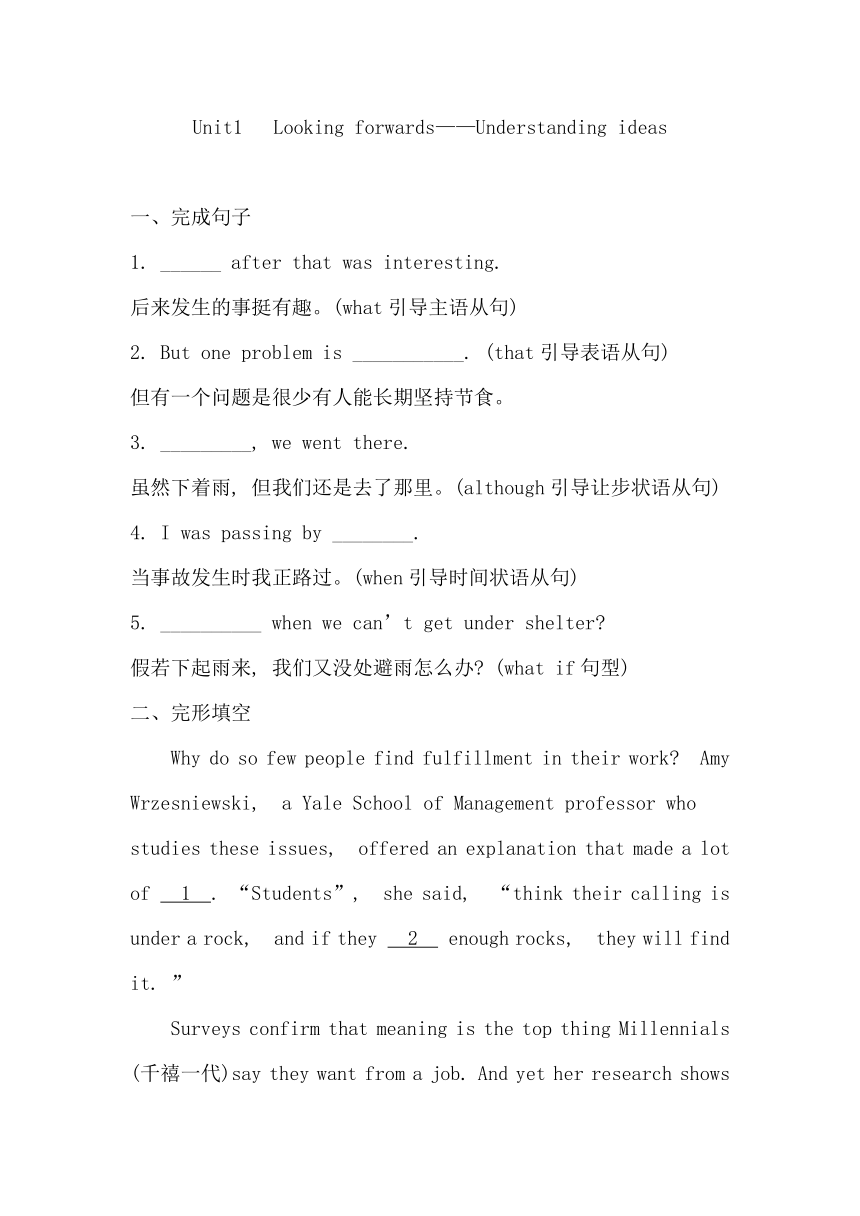 | |
| 格式 | zip | ||
| 文件大小 | 21.2KB | ||
| 资源类型 | 教案 | ||
| 版本资源 | 外研版(2019) | ||
| 科目 | 英语 | ||
| 更新时间 | 2022-01-26 17:07:04 | ||
图片预览

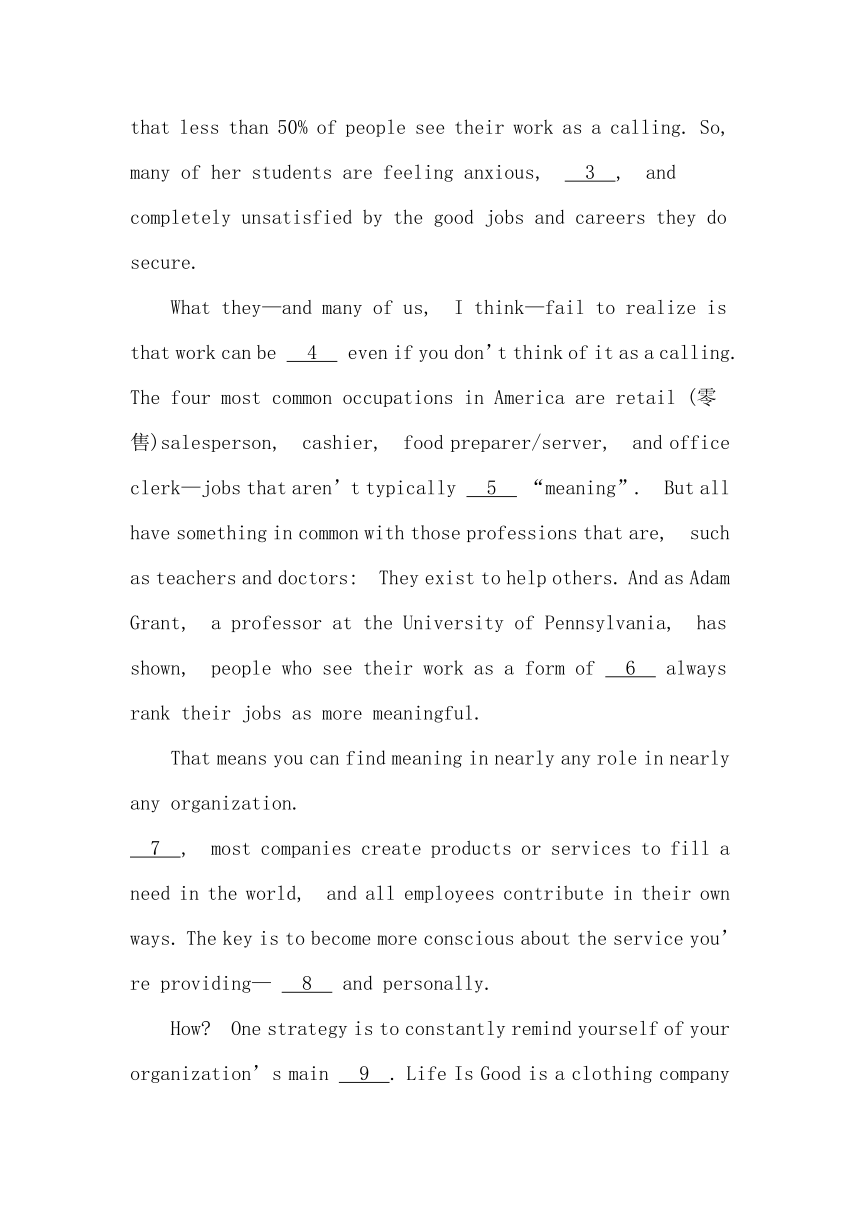
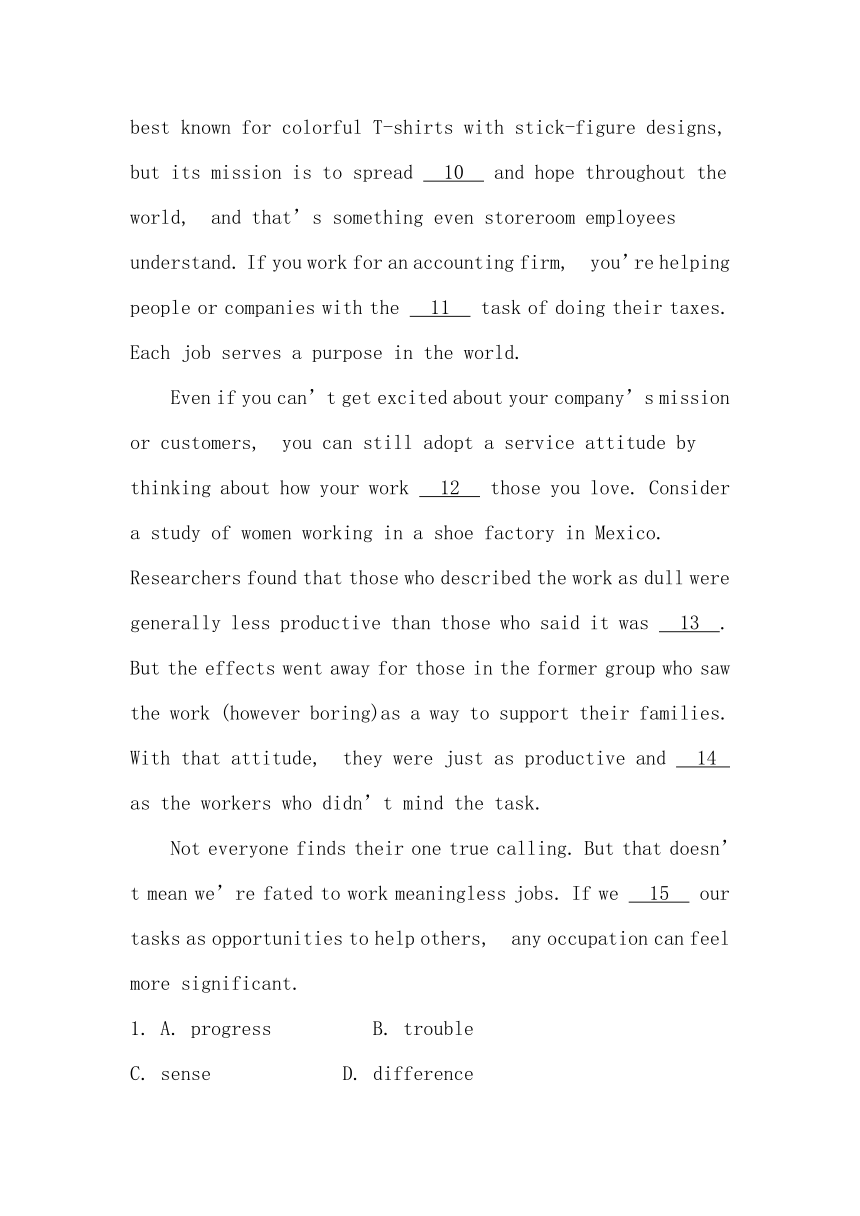
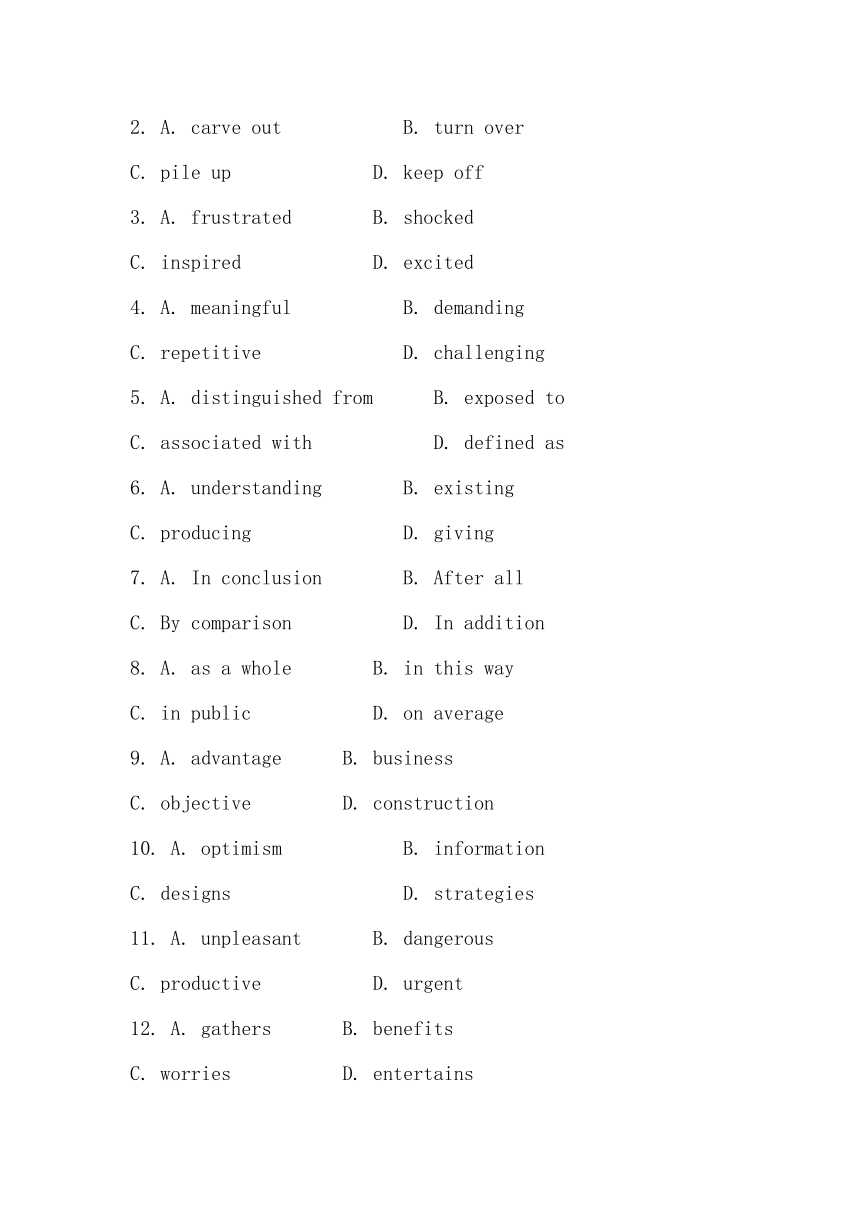
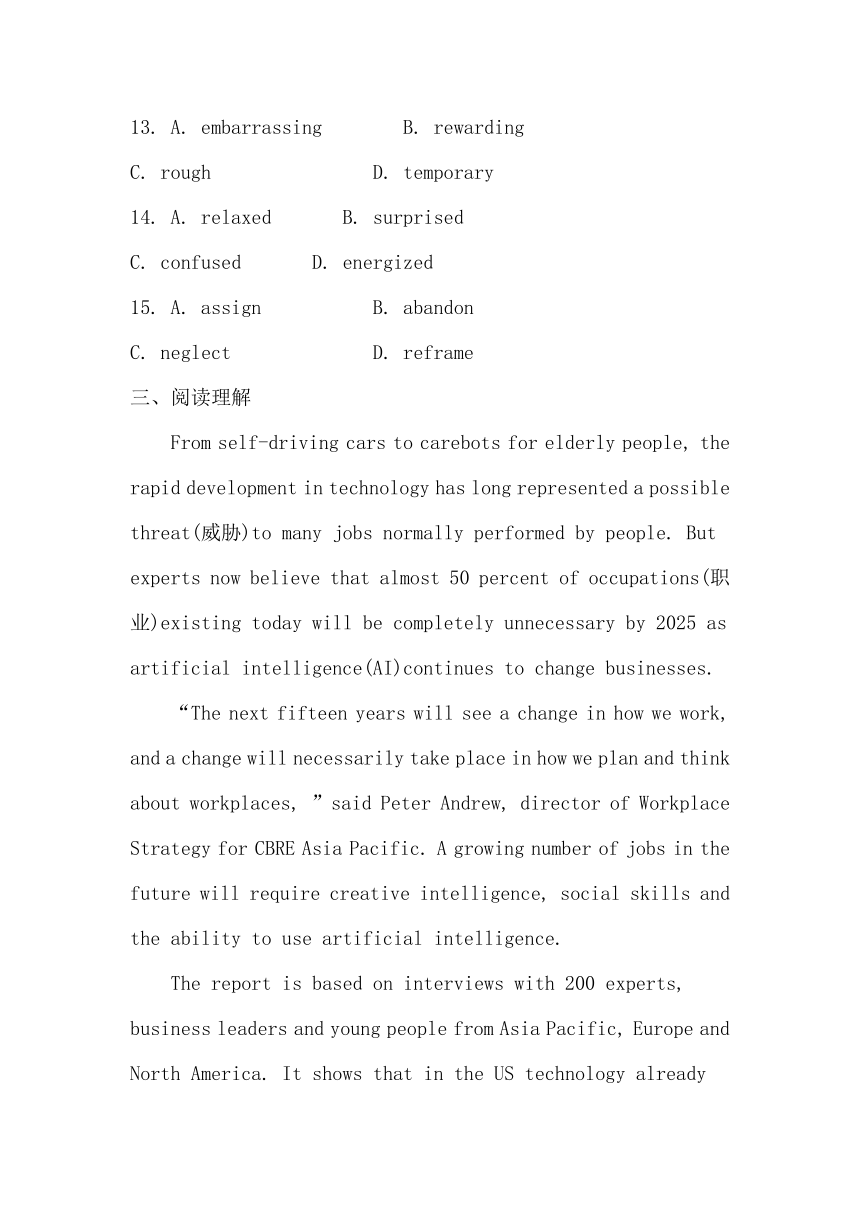
文档简介
Unit1 Looking forwards——Understanding ideas
一、完成句子
1. ______ after that was interesting.
后来发生的事挺有趣。(what引导主语从句)
2. But one problem is ___________. (that引导表语从句)
但有一个问题是很少有人能长期坚持节食。
3. _________, we went there.
虽然下着雨, 但我们还是去了那里。(although引导让步状语从句)
4. I was passing by ________.
当事故发生时我正路过。(when引导时间状语从句)
5. __________ when we can’t get under shelter
假若下起雨来, 我们又没处避雨怎么办 (what if句型)
二、完形填空
Why do so few people find fulfillment in their work Amy Wrzesniewski, a Yale School of Management professor who studies these issues, offered an explanation that made a lot of 1 . “Students”, she said, “think their calling is under a rock, and if they 2 enough rocks, they will find it. ”
Surveys confirm that meaning is the top thing Millennials (千禧一代)say they want from a job. And yet her research shows that less than 50% of people see their work as a calling. So, many of her students are feeling anxious, 3 , and completely unsatisfied by the good jobs and careers they do secure.
What they—and many of us, I think—fail to realize is that work can be 4 even if you don’t think of it as a calling. The four most common occupations in America are retail (零售)salesperson, cashier, food preparer/server, and office clerk—jobs that aren’t typically 5 “meaning”. But all have something in common with those professions that are, such as teachers and doctors: They exist to help others. And as Adam Grant, a professor at the University of Pennsylvania, has shown, people who see their work as a form of 6 always rank their jobs as more meaningful.
That means you can find meaning in nearly any role in nearly any organization.
7 , most companies create products or services to fill a need in the world, and all employees contribute in their own ways. The key is to become more conscious about the service you’re providing— 8 and personally.
How One strategy is to constantly remind yourself of your organization’s main 9 . Life Is Good is a clothing company best known for colorful T-shirts with stick-figure designs, but its mission is to spread 10 and hope throughout the world, and that’s something even storeroom employees understand. If you work for an accounting firm, you’re helping people or companies with the 11 task of doing their taxes. Each job serves a purpose in the world.
Even if you can’t get excited about your company’s mission or customers, you can still adopt a service attitude by thinking about how your work 12 those you love. Consider a study of women working in a shoe factory in Mexico. Researchers found that those who described the work as dull were generally less productive than those who said it was 13 . But the effects went away for those in the former group who saw the work (however boring)as a way to support their families. With that attitude, they were just as productive and 14 as the workers who didn’t mind the task.
Not everyone finds their one true calling. But that doesn’t mean we’re fated to work meaningless jobs. If we 15 our tasks as opportunities to help others, any occupation can feel more significant.
1. A. progress B. trouble
C. sense D. difference
2. A. carve out B. turn over
C. pile up D. keep off
3. A. frustrated B. shocked
C. inspired D. excited
4. A. meaningful B. demanding
C. repetitive D. challenging
5. A. distinguished from B. exposed to
C. associated with D. defined as
6. A. understanding B. existing
C. producing D. giving
7. A. In conclusion B. After all
C. By comparison D. In addition
8. A. as a whole B. in this way
C. in public D. on average
9. A. advantage B. business
C. objective D. construction
10. A. optimism B. information
C. designs D. strategies
11. A. unpleasant B. dangerous
C. productive D. urgent
12. A. gathers B. benefits
C. worries D. entertains
13. A. embarrassing B. rewarding
C. rough D. temporary
14. A. relaxed B. surprised
C. confused D. energized
15. A. assign B. abandon
C. neglect D. reframe
三、阅读理解
From self-driving cars to carebots for elderly people, the rapid development in technology has long represented a possible threat(威胁)to many jobs normally performed by people. But experts now believe that almost 50 percent of occupations(职业)existing today will be completely unnecessary by 2025 as artificial intelligence(AI)continues to change businesses.
“The next fifteen years will see a change in how we work, and a change will necessarily take place in how we plan and think about workplaces, ”said Peter Andrew, director of Workplace Strategy for CBRE Asia Pacific. A growing number of jobs in the future will require creative intelligence, social skills and the ability to use artificial intelligence.
The report is based on interviews with 200 experts, business leaders and young people from Asia Pacific, Europe and North America. It shows that in the US technology already destroys more jobs than it creates. But the report states, “Losing occupations does not necessarily mean losing jobs—just changing what people do. ”Growth in new jobs could occur as much, according to the research. “The growth of companies that have the speed and technological knowledge will directly challenge big companies, ”it states.
A report by Pew Research Center found 52 percent of experts in artificial intelligence and robotics were optimistic about the future and believed there would still be enough jobs in the next few years. “The optimists pictured a future in which robots do not take the place of more jobs than they create, ”according to Aaron Smith, the report’s co-author.
“Technology will continue to affect jobs, but more jobs seem likely to be created. Although there have always been people out of work, when we reach a few billion people there will be billions of jobs. There is no shortage of things that need to be done and that will not change, ”Microsoft’s Jonathan Grudin told researchers.
1. What is the first paragraph mainly about
A. The result of job reduction.
B. The fast development of AI.
C. The future life of elderly people.
D. The influence of technology on jobs.
2. What will people most probably do in the future
A. Take the place of AI.
B. Work in a traditional way.
C. Take up jobs requiring creativity.
D. Enjoy life without working anymore.
3. What can be known from Grudin’s words in the last paragraph
A. More people will not have a job.
B. More jobs tend to appear in the future.
C. Job competition is likely to grow sharper.
D. Technology will have less control over jobs.
4. What is the best title for the text
A. Are People Losing Their Jobs
B. The Requirements for Future Jobs
C. The Challenging Life in the Future
D. Does Technology Simplify Everything
答案和解析
一、完成句子
1.What happened
2.that few people can stick to a diet for long
3.Although it was raining
4.when the accident happened
5.What if it rains
二、完形填空
1.C。句意: 耶鲁大学管理学院研究这些问题的教授Amy Wrzesniewski给出了一个有道理的解释。 progress进步, 发展; trouble麻烦, 烦恼, 故障; sense道理, 感觉, 观念; difference差异, 不同。短语make sense讲得通, 有道理。根据offered an explanation可知此处表示有道理的解释。故选C。
2.B。句意: 她说, “学生们认为他们对工作的成就感还没有被挖掘出来, 如果被挖掘出来, 就能能找到工作的成就感。” carve out开拓; turn over把……翻过来, 翻阅, 移交给; pile up堆积, 积累; keep off让开, 不接近。根据they will find it可知此处表示要把那些岩石翻开。故选B。
3.A。句意: 因此, 她的许多学生感到焦虑、沮丧, 对他们所拥有的好工作和职业完全不满意。 frustrated懊恼的, 沮丧的; shocked震惊的; inspired受鼓舞的, 品质优秀的; excited激动的。根据feeling anxious和and completely unsatisfied可知此处用沮丧的符合题意。故选A。
4.A。句意: 我认为, 他们和我们中的许多人没有意识到, 即使你认为工作是没有成就感的, 它也可能是有意义的。 meaningful有意义的; demanding要求高的, 费力的; repetitive重复的; challenging挑战的。根据fail to realize可知此处表示工作可以是有意义的。故选A。
5.C。句意: 在美国, 最常见的四种职业是零售销售、收银员、食品加工者/服务员以及办公室文员, 这些工作与“意义”无关。 distinguished from区别于; exposed to暴露于; associated with与……相联系, 与……有关; defined as界定, 给……下定义。根据jobs that aren’t typically可知此处表示这些工作与“意义”无关。故选C。
6.D。句意: 正如宾夕法尼亚大学教授Adam Grant所表明的, 那些把工作视为奉献的人, 总是认为自己的工作更有意义。 understanding理解; existing存在; producing生产; giving给予, 付出, 奉献。根据They exist to help others可知此处表示那些把工作视为奉献的人, 总是认为自己的工作更有意义。故选D。
7.B。句意: 毕竟, 大多数公司创造产品或服务来满足世界的需求, 所有员工都以自己的方式做出贡献。 In conclusion总之, 最后; After all毕竟, 终究; By comparison相比之下; In addition另外, 此外。根据上文That means you can find meaning in nearly any role in nearly any organization. 可知此处表示毕竟之意。故选B。
8.A。句意: 关键是要更加意识到你所提供的服务——既是整体的又是个人的。 as a whole总的来说; in this way用这种方法; in public公开地, 当众; on average平均, 通常。根据and personally可知此处表示既是整体的又是个人的。故选A。
9.C。句意: 有一种策略是不断提醒自己公司的主要目标。 advantage优势, 利益; business生意, 商业; objective 目的, 目标; construction建设。根据but its mission is to spread可知此处表示不断提醒自己公司的主要目标。故选C。
10.A。句意: Life Is Good是一家服装公司, 最出名的是色彩鲜艳的T恤和线条设计, 但它的使命是向全世界传播乐观和希望, 那是连储藏室的员工都能理解的。 optimism乐观, 乐观主义; information知识, 信息; designs设计; strategies战略, 策略。根据and hope throughout the world可知此处表示它的使命是向全世界传播乐观和希望。故选A。
11.A。句意: 如果你在一家会计公司工作, 你就是在帮助人们或公司完成一项不愉快的税务工作。 unpleasant使人不愉快的, 讨厌的; dangerous危险的; productive生产的, 多产的; urgent紧急的, 急迫的。根据doing their taxes可知对人们或者公司而言, 税务工作是不愉快的。故选A。
12.B。句意: 即使你不能对公司的使命或客户感到兴奋, 你仍然可以通过思考你的工作如何让你所爱的人受益来采取一种服务态度。 gathers收集, 集聚; benefits有益于; worries担忧; entertains招待, 娱乐。根据those you love可知此处表示思考你的工作如何让你所爱的人受益。故选B。
13.B。句意: 研究人员发现, 那些描述工作枯燥的人通常比那些说工作有益的人效率更低。 embarrassing令人尴尬的; rewarding有益的, 值得的; rough粗糙的, 艰苦的; temporary暂时的, 临时的。根据than可知此处表示两种态度的对比, 由those who described the work as dull were generally less productive可知此处表示那些认为工作有益的人。故选B。
14.D。句意: 有了这种态度, 他们就像那些不介意任务的员工一样富有成效和精力充沛。 relaxed放松的, 自在的; surprised感到惊讶的; confused困惑的; energized有活力的。根据they were just as productive可知此处用有活力的符合题意。故选D。
15.D。句意: 如果我们把自己的任务重新定义为帮助他人的机会, 那么任何职业都会让人感觉更有意义。 assign分配, 指派; abandon遗弃, 离开; neglect忽略, 忽视; reframe全新地拟定(或表达), 再构造。根据any occupation can feel more significant可知此处表示把自己的任务重新定义。故选D。
三、阅读理解
1.D。段落大意题。根据第一段内容, 特别是第一句From self-driving cars to carebots for elderly people, the rapid development in technology has long represented a possible threat to many jobs normally performed by people. 可知, 科技的快速发展对由人完成的工作构成威胁, 由此可知, 第一段主要介绍的是科技对职业的影响。故选D。
2.C。细节理解题。根据第二段最后一句A growing number of jobs in the future will require creative intelligence, social skills and the ability to use artificial intelligence. 可知, 未来越来越多的职业需要人们有创造性智慧、社交能力和使用人工智能的能力, 由此可知, 未来人们将从事需要创造力的工作, 故选C。
3.B。推理判断题。根据文章最后一段内容, 尤其是“Technology will continue to affect jobs, but more jobs seem likely to be created”可知, 在未来社会, 更多的职业可能会被创造出来, 故选B。
4.A。主旨大意题。通读全文, 特别是根据第三段中的“Losing occupations does not necessarily mean losing jobs—just changing what people do. ”可知, 文章主要介绍了人工智能的发展会对未来人们的职业产生影响, 但这并不意味着人们会失去工作, 将来会有更多的职业出现, 故选A。
一、完成句子
1. ______ after that was interesting.
后来发生的事挺有趣。(what引导主语从句)
2. But one problem is ___________. (that引导表语从句)
但有一个问题是很少有人能长期坚持节食。
3. _________, we went there.
虽然下着雨, 但我们还是去了那里。(although引导让步状语从句)
4. I was passing by ________.
当事故发生时我正路过。(when引导时间状语从句)
5. __________ when we can’t get under shelter
假若下起雨来, 我们又没处避雨怎么办 (what if句型)
二、完形填空
Why do so few people find fulfillment in their work Amy Wrzesniewski, a Yale School of Management professor who studies these issues, offered an explanation that made a lot of 1 . “Students”, she said, “think their calling is under a rock, and if they 2 enough rocks, they will find it. ”
Surveys confirm that meaning is the top thing Millennials (千禧一代)say they want from a job. And yet her research shows that less than 50% of people see their work as a calling. So, many of her students are feeling anxious, 3 , and completely unsatisfied by the good jobs and careers they do secure.
What they—and many of us, I think—fail to realize is that work can be 4 even if you don’t think of it as a calling. The four most common occupations in America are retail (零售)salesperson, cashier, food preparer/server, and office clerk—jobs that aren’t typically 5 “meaning”. But all have something in common with those professions that are, such as teachers and doctors: They exist to help others. And as Adam Grant, a professor at the University of Pennsylvania, has shown, people who see their work as a form of 6 always rank their jobs as more meaningful.
That means you can find meaning in nearly any role in nearly any organization.
7 , most companies create products or services to fill a need in the world, and all employees contribute in their own ways. The key is to become more conscious about the service you’re providing— 8 and personally.
How One strategy is to constantly remind yourself of your organization’s main 9 . Life Is Good is a clothing company best known for colorful T-shirts with stick-figure designs, but its mission is to spread 10 and hope throughout the world, and that’s something even storeroom employees understand. If you work for an accounting firm, you’re helping people or companies with the 11 task of doing their taxes. Each job serves a purpose in the world.
Even if you can’t get excited about your company’s mission or customers, you can still adopt a service attitude by thinking about how your work 12 those you love. Consider a study of women working in a shoe factory in Mexico. Researchers found that those who described the work as dull were generally less productive than those who said it was 13 . But the effects went away for those in the former group who saw the work (however boring)as a way to support their families. With that attitude, they were just as productive and 14 as the workers who didn’t mind the task.
Not everyone finds their one true calling. But that doesn’t mean we’re fated to work meaningless jobs. If we 15 our tasks as opportunities to help others, any occupation can feel more significant.
1. A. progress B. trouble
C. sense D. difference
2. A. carve out B. turn over
C. pile up D. keep off
3. A. frustrated B. shocked
C. inspired D. excited
4. A. meaningful B. demanding
C. repetitive D. challenging
5. A. distinguished from B. exposed to
C. associated with D. defined as
6. A. understanding B. existing
C. producing D. giving
7. A. In conclusion B. After all
C. By comparison D. In addition
8. A. as a whole B. in this way
C. in public D. on average
9. A. advantage B. business
C. objective D. construction
10. A. optimism B. information
C. designs D. strategies
11. A. unpleasant B. dangerous
C. productive D. urgent
12. A. gathers B. benefits
C. worries D. entertains
13. A. embarrassing B. rewarding
C. rough D. temporary
14. A. relaxed B. surprised
C. confused D. energized
15. A. assign B. abandon
C. neglect D. reframe
三、阅读理解
From self-driving cars to carebots for elderly people, the rapid development in technology has long represented a possible threat(威胁)to many jobs normally performed by people. But experts now believe that almost 50 percent of occupations(职业)existing today will be completely unnecessary by 2025 as artificial intelligence(AI)continues to change businesses.
“The next fifteen years will see a change in how we work, and a change will necessarily take place in how we plan and think about workplaces, ”said Peter Andrew, director of Workplace Strategy for CBRE Asia Pacific. A growing number of jobs in the future will require creative intelligence, social skills and the ability to use artificial intelligence.
The report is based on interviews with 200 experts, business leaders and young people from Asia Pacific, Europe and North America. It shows that in the US technology already destroys more jobs than it creates. But the report states, “Losing occupations does not necessarily mean losing jobs—just changing what people do. ”Growth in new jobs could occur as much, according to the research. “The growth of companies that have the speed and technological knowledge will directly challenge big companies, ”it states.
A report by Pew Research Center found 52 percent of experts in artificial intelligence and robotics were optimistic about the future and believed there would still be enough jobs in the next few years. “The optimists pictured a future in which robots do not take the place of more jobs than they create, ”according to Aaron Smith, the report’s co-author.
“Technology will continue to affect jobs, but more jobs seem likely to be created. Although there have always been people out of work, when we reach a few billion people there will be billions of jobs. There is no shortage of things that need to be done and that will not change, ”Microsoft’s Jonathan Grudin told researchers.
1. What is the first paragraph mainly about
A. The result of job reduction.
B. The fast development of AI.
C. The future life of elderly people.
D. The influence of technology on jobs.
2. What will people most probably do in the future
A. Take the place of AI.
B. Work in a traditional way.
C. Take up jobs requiring creativity.
D. Enjoy life without working anymore.
3. What can be known from Grudin’s words in the last paragraph
A. More people will not have a job.
B. More jobs tend to appear in the future.
C. Job competition is likely to grow sharper.
D. Technology will have less control over jobs.
4. What is the best title for the text
A. Are People Losing Their Jobs
B. The Requirements for Future Jobs
C. The Challenging Life in the Future
D. Does Technology Simplify Everything
答案和解析
一、完成句子
1.What happened
2.that few people can stick to a diet for long
3.Although it was raining
4.when the accident happened
5.What if it rains
二、完形填空
1.C。句意: 耶鲁大学管理学院研究这些问题的教授Amy Wrzesniewski给出了一个有道理的解释。 progress进步, 发展; trouble麻烦, 烦恼, 故障; sense道理, 感觉, 观念; difference差异, 不同。短语make sense讲得通, 有道理。根据offered an explanation可知此处表示有道理的解释。故选C。
2.B。句意: 她说, “学生们认为他们对工作的成就感还没有被挖掘出来, 如果被挖掘出来, 就能能找到工作的成就感。” carve out开拓; turn over把……翻过来, 翻阅, 移交给; pile up堆积, 积累; keep off让开, 不接近。根据they will find it可知此处表示要把那些岩石翻开。故选B。
3.A。句意: 因此, 她的许多学生感到焦虑、沮丧, 对他们所拥有的好工作和职业完全不满意。 frustrated懊恼的, 沮丧的; shocked震惊的; inspired受鼓舞的, 品质优秀的; excited激动的。根据feeling anxious和and completely unsatisfied可知此处用沮丧的符合题意。故选A。
4.A。句意: 我认为, 他们和我们中的许多人没有意识到, 即使你认为工作是没有成就感的, 它也可能是有意义的。 meaningful有意义的; demanding要求高的, 费力的; repetitive重复的; challenging挑战的。根据fail to realize可知此处表示工作可以是有意义的。故选A。
5.C。句意: 在美国, 最常见的四种职业是零售销售、收银员、食品加工者/服务员以及办公室文员, 这些工作与“意义”无关。 distinguished from区别于; exposed to暴露于; associated with与……相联系, 与……有关; defined as界定, 给……下定义。根据jobs that aren’t typically可知此处表示这些工作与“意义”无关。故选C。
6.D。句意: 正如宾夕法尼亚大学教授Adam Grant所表明的, 那些把工作视为奉献的人, 总是认为自己的工作更有意义。 understanding理解; existing存在; producing生产; giving给予, 付出, 奉献。根据They exist to help others可知此处表示那些把工作视为奉献的人, 总是认为自己的工作更有意义。故选D。
7.B。句意: 毕竟, 大多数公司创造产品或服务来满足世界的需求, 所有员工都以自己的方式做出贡献。 In conclusion总之, 最后; After all毕竟, 终究; By comparison相比之下; In addition另外, 此外。根据上文That means you can find meaning in nearly any role in nearly any organization. 可知此处表示毕竟之意。故选B。
8.A。句意: 关键是要更加意识到你所提供的服务——既是整体的又是个人的。 as a whole总的来说; in this way用这种方法; in public公开地, 当众; on average平均, 通常。根据and personally可知此处表示既是整体的又是个人的。故选A。
9.C。句意: 有一种策略是不断提醒自己公司的主要目标。 advantage优势, 利益; business生意, 商业; objective 目的, 目标; construction建设。根据but its mission is to spread可知此处表示不断提醒自己公司的主要目标。故选C。
10.A。句意: Life Is Good是一家服装公司, 最出名的是色彩鲜艳的T恤和线条设计, 但它的使命是向全世界传播乐观和希望, 那是连储藏室的员工都能理解的。 optimism乐观, 乐观主义; information知识, 信息; designs设计; strategies战略, 策略。根据and hope throughout the world可知此处表示它的使命是向全世界传播乐观和希望。故选A。
11.A。句意: 如果你在一家会计公司工作, 你就是在帮助人们或公司完成一项不愉快的税务工作。 unpleasant使人不愉快的, 讨厌的; dangerous危险的; productive生产的, 多产的; urgent紧急的, 急迫的。根据doing their taxes可知对人们或者公司而言, 税务工作是不愉快的。故选A。
12.B。句意: 即使你不能对公司的使命或客户感到兴奋, 你仍然可以通过思考你的工作如何让你所爱的人受益来采取一种服务态度。 gathers收集, 集聚; benefits有益于; worries担忧; entertains招待, 娱乐。根据those you love可知此处表示思考你的工作如何让你所爱的人受益。故选B。
13.B。句意: 研究人员发现, 那些描述工作枯燥的人通常比那些说工作有益的人效率更低。 embarrassing令人尴尬的; rewarding有益的, 值得的; rough粗糙的, 艰苦的; temporary暂时的, 临时的。根据than可知此处表示两种态度的对比, 由those who described the work as dull were generally less productive可知此处表示那些认为工作有益的人。故选B。
14.D。句意: 有了这种态度, 他们就像那些不介意任务的员工一样富有成效和精力充沛。 relaxed放松的, 自在的; surprised感到惊讶的; confused困惑的; energized有活力的。根据they were just as productive可知此处用有活力的符合题意。故选D。
15.D。句意: 如果我们把自己的任务重新定义为帮助他人的机会, 那么任何职业都会让人感觉更有意义。 assign分配, 指派; abandon遗弃, 离开; neglect忽略, 忽视; reframe全新地拟定(或表达), 再构造。根据any occupation can feel more significant可知此处表示把自己的任务重新定义。故选D。
三、阅读理解
1.D。段落大意题。根据第一段内容, 特别是第一句From self-driving cars to carebots for elderly people, the rapid development in technology has long represented a possible threat to many jobs normally performed by people. 可知, 科技的快速发展对由人完成的工作构成威胁, 由此可知, 第一段主要介绍的是科技对职业的影响。故选D。
2.C。细节理解题。根据第二段最后一句A growing number of jobs in the future will require creative intelligence, social skills and the ability to use artificial intelligence. 可知, 未来越来越多的职业需要人们有创造性智慧、社交能力和使用人工智能的能力, 由此可知, 未来人们将从事需要创造力的工作, 故选C。
3.B。推理判断题。根据文章最后一段内容, 尤其是“Technology will continue to affect jobs, but more jobs seem likely to be created”可知, 在未来社会, 更多的职业可能会被创造出来, 故选B。
4.A。主旨大意题。通读全文, 特别是根据第三段中的“Losing occupations does not necessarily mean losing jobs—just changing what people do. ”可知, 文章主要介绍了人工智能的发展会对未来人们的职业产生影响, 但这并不意味着人们会失去工作, 将来会有更多的职业出现, 故选A。
